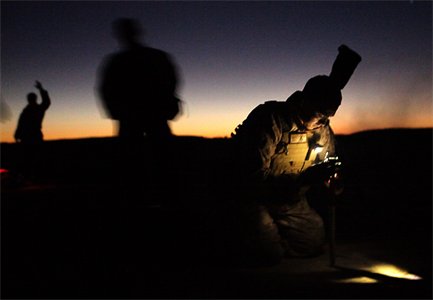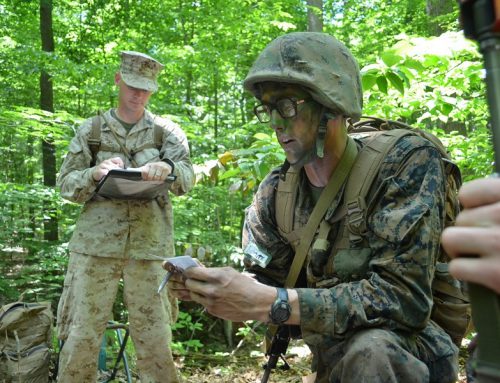Night land navigation is an important event at Marine OCS. It makes up 5% of the 25% academic grade (i.e., 5% of your total OCS grade). There is going to be at least one practice round so don’t worry too much if you aren’t confident in this area. Candidates will be able to get the help they need from instructors to be successful with this.
Here is a simple diagram showing how the course is setup.
Every candidate is given a card with 5 letters, 5 azimuths, and 5 distances. Starting at a letter you shoot the azimuth, walk the distance, and mark the letter (it may be a letters on one side and number on the other) for where you end up. It may sound simple, but it is definitely going to be challenging considering the darkness and surprisingly chaotic terrain. There are literally dozens of enormous trees that have fallen over. Navigating around the obstacles while maintaining the correct azimuth is not easy.
Scoring
As mentioned, the night land navigation course makes up around 5% of your total OCS grade. If you don’t think that’s much you should check the evaluation guidelines again. Candidates must pass OCS with at least an 80% average overall AND in each of the three categories: leadership, academics, and physical fitness.
Scoring a zero on the night land navigation course would take your academic grade straight to 80% (1 – 5/25 * 100 = 80%) . One would have to pass every other exam with 100% to pass OCS, or else they would fall below the 80% average.
It is uncommon for a candidate to score a zero. However, the night land navigation grade is based on only 5 points. Candidates who miss 2 of the 5 points will still fail the course with 60%. Just like any other exam a failing score has to be retaken on the weekend, or occasionally during the week. Candidates retain their original score for their OCS grade, but since every exam must be passed you still have to redo the course.
All of this can be summed up to “DON’T MISS MORE THAN 1 POINT”
Doing so will ruin your OCS grade and negatively impact the few hours of relaxation candidates get during liberty.
Night Land Navigation Basics
The official course information for OCS night land navigation can be found here.
A more detailed and comprehensive outline from The Basic School (TBS) can be found here.
The TBS material is going to better the better resource, but reading through both would be most ideal.
Getting Around Obstacles
A happy and confident candidate is walking along in the middle of the night with a compass in hand and a perfectly shot azimuth. All of the sudden they run into some interesting terrain like what you see above. What is a candidate to do?
In all honestly, there is no perfect way to deal with some of these obstacles. Candidates should be very cautious when something like this happens and maybe even restart the point if you get out of sync with what you are doing. Here are a few methods that can be used.
Shoot Yourself Around the obstacle
This can be a little complicated. Especially considering you are going to be relying upon the clicks of your compass for accuracy. The goal is to box yourself around the obstacle by modifying the azimuth by 90 degrees and walking equal distances around the obstacle. This simple chart gives an idea of what this would look like. Yes, I do know that it is horrible, but you get the idea.
Candidates should avoid doing this unless completely necessary. There are too many ways to make mistakes
Shoot a point beyond the obstacle
If there is enough light you can look for a specific point beyond the obstacle that is in line with azimuth. It must be a very specific point like a narrow tree. Double and triple check this to make sure. Then just walk to the point you were looking at. From there shoot the azimuth again and continue.
Deal with it
Sometimes the best option is going to be to climb over the tree, or walk through the brush. This is a decision you will have to make when the time comes.
No matter what don’t hesitate to restart the point if you don’t end up right on the target point.
Tips For Success
Highlight the card
Bring a highlighter with you into the field when you know night land navigation is coming up. Use the highlighter to mark the entire card you get with the starting points, azimuths, and distances. This will make the card more visible in the night.
Bold the letters and numbers
For the same reason as highlighting, if you make the information on the card bolder and darker it will be easier to see in the night.
Memorize beforehand
Don’t rely on this too much. However, there is some benefit to remembering your azimuths and distances before going into the field at night. You shouldn’t base your actions on memory alone, but if it turns out to be an especially dark night then you will be glad to have something to confirm what you are reading is correct.
What Not To Do
There are going to be several factors that impact the difficulty of the course. The weather is going to change the landscape. The moon is going to significantly affect your visibility. No matter what the circumstances there are a few things that candidates should avoid doing.
Do Not Tap The Ammo Cans
A few years back an entire platoon was kicked out of OCS after the night land navigation. Yes, you read that correctly. An ENTIRE PLATOON got sent home.
The gist of the story is that several candidates collaborated to help each other out by tapping on the target points which are ammo cans with sprayed on letters. The noise would help other candidates better navigate themselves through the darkness. It probably wasn’t their intention to cheat. Maybe they were just incompetent and thought it was like a teamwork thing or something. However, it was definitely seen as cheating. Many candidates who weren’t involved got caught in the cross fire and suffered the consequences as well.
The point is that you shouldn’t make any noise that may be misconstrued as cheating. Try not to do something as little as sneeze. If you hear of candidates trying to do something that seems out of place you should report it.
Do Not Use The Poncho Method
Candidates are allowed to use a light if they do it properly. This involves using a poncho, it’s like a rain coat, to envelope yourself on the ground. You create a little dome of sorts. As long as light doesn’t illuminate out from the area between the poncho and the ground this method is allowed.
The catch is that if you don’t do it properly you automatically fail. The risk simply does not outweigh the reward. There are several other ways to get through the night land navigation course successfully without any additional light.
Do Not Hesitate To Reshoot
This is a tip often ignored and many candidates will regret it. You are going to be tired and exhausted. The thought of having to redo a point will not seem appealing. Maybe you ended up between points A and B, but since you were slightly closer to A you figured that must be the correct spot. It may very well be the right point, but is it really worth risking 1% of your OCS grade.
IT DOESN’T MATTER IF YOU FINISH THE COURSE FIRST!
Many candidates finish the course in just 10-20 minutes. What they don’t realize is that they still have to wait for every other candidate to finish. Instead of risking a point and giving in to exhaustion go back to the starting point and confirm the target.
Do Not Forget To Secure The Compass
The instructors will remind candidates of this several times. The compass must be tied to your LBV and completely secured in it’s pouch prior to reporting to an instructor. Since candidates report after every point you will have to do this at least 5 times. Forgetting to do this is an automatic miss for the point you are reporting on. Just don’t forget.
Hopefully everyone out there has an OSO, or NROTC unit, that will help teach them land navigation. Learning the proper techniques prior to OCS will give you a significant advantage.
As a final note, PLC Juniors generally does only day land navigation. The night element will be added when you attend seniors. If you are in that program then don’t worry too much about this, but keep it in the back of your mind for when it does arrive.









Leave A Comment